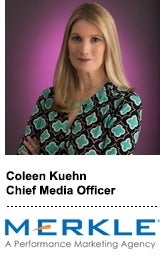When Merkle launched as a CRM and performance media agency in 1988, its strong data repository and direct-response focus set it apart from other media agencies.
As marketing went increasingly digital, Merkle’s strong data foundation laid the groundwork for a natural evolution into programmatic buying, turning it into a competitor for digital and media agencies. It’s why Japanese holding company Dentsu Aegis made a majority investment in the company in August.
While Merkle has been buying programmatic media for years, it didn’t have a formal practice lead until Monday, when it brought on agency vet Coleen Kuehn as chief media officer.
“The responsibilities existed before, but they were overseen by Michael Komasinski, our COO, and Gerry Bavaro, who is now on our product team,” Kuehn told AdExchanger. “Having that under a single leader provides a lot more integration, scale and synergy.”
Kuehn will oversee 650 employees in Merkle’s media division, which spans seven US markets in areas like communications and media planning, display, social, paid search, SEO and programmatic.
An agency vet with 20 years of experience, Kuehn previously served as president at Publicis’ MediaVest and held leadership roles at Havas and MediaCom.
She spoke with AdExchanger.
AdExchanger: Why did Merkle formalize a chief media officer role now?
COLEEN KUEHN: As clients look for more holistic media solutions, we needed to connect our search, display and social practices more closely. We’ve been able to provide more integrated offerings. We’re seeing increased demand for those kinds of services from clients like HBO.
What’s your relationship like with those clients?
We are their digital agency of record (AOR). While we may have traditionally been seen as a performance media shop, our future is as a leader in people-based marketing. We’re moving up the funnel.
With HBO, we’re driving awareness and engagement for HBO Tune In. For another major entertainment client, we’re driving awareness for film releases, engagement with content and creating social conversation.
It’s very different than what we do for financial services clients. That’s going to be part of Merkle’s evolution.
Merkle has always billed itself as a CRM agency. Does your work with these clients mark a shift in that strategy? How do senior agency hires like yourself play into that shift?
Merkle’s authority in people-based marketing was driven by the company’s heritage in data, analytics, technology and addressable media at scale. I don’t think this is a shift away from that. It’s about fueling the power of customer databases and actioning them in the media world.
Over the past 18 months, we’ve hired a number of people from the agency world to deliver on that promise. Merkle 1.0 was the CRM infrastructure, 2.0 was smart analytics and audience decisioning and now we’re executing on data-driven and people-based marketing decisions.
Do you still have relationships that focus on CRM and performance?
We have clients with CRM and database assignments, which we can take all the way up through audience planning and connect that to campaign planning and digital AOR work.
How much media do you buy at Merkle? Has that grown since Dentsu Aegis made a majority investment in the company?
We’re projected to have about $2 billion in digital media this year. I don’t think we’ve yet seen a direct correlation with [Dentsu]. We’ve identified opportunities within Dentsu where we can grow our client relationships, so that will be part of our growth story.
Merkle buys a lot of programmatic media. How does that jell with Dentsu’s programmatic capabilities at Accordant and Amnet? Do you ever buy through Amnet or vice versa?
Programmatic continues to be a core part of our offering. What’s different about us is it’s in-house and it’s fully transparent. A lot of clients want Merkle to be their digital AOR, so programmatic is an important ingredient in that mix.
We haven’t [bought programmatic through Amnet] yet, but we would consider it where it makes sense. [Dentsu has] been much more collaborative in terms of how the partners work together than other environments I’ve been in before.
How does Merkle work with the other agencies at Dentsu?
There are a number of initiatives on the integration front. Amplify helps coordinate investment strategy across partners. They held a meeting yesterday to talk about what important partnerships look like across the network.
Parts of the organization collaborate on data strategy. John Lee heads that area up. They’re doing some really smart, innovative things. We’ll consult and supply thought leadership and solutions for the network.
What services can you provide as a part of Dentsu that you couldn’t before? How can you help more traditional media-buying agencies at Dentsu be more targeted?
Dentsu’s majority investment in Merkle is proof in the coming of age of people-based marketing. It reaffirms that it’s the future for smart marketing and advertising and that we’re on the right path.
Dentsu has an ambition that every agency become more data-driven, tech-enabled and digitally savvy. Their intent is to have every Dentsu network that does media planning tap into our M1 platform and our data strategies so they can deliver highly targeted, measurable and customized experiences for consumers.
This interview has been edited and condensed.















